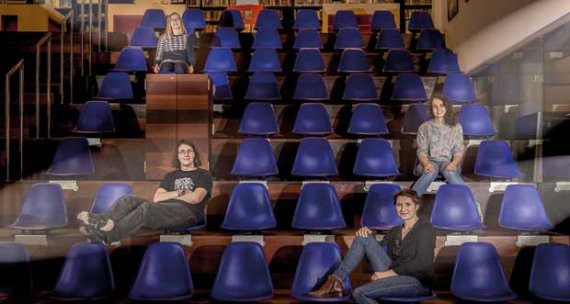Picture (Sven Menschel): The board of Stichting Popcultuur Wageningen with Marjanne Zander (left), Jona Merx, Marjolein Oltheten and Tess Hogeboom.
When the Unitas pop venue closed in 2009, pessimists predicted that Wageningen would turn into a cultural desert. But in fact the opposite happened. There are more gigs with hip new bands than ever before. The secret? A small group of enthusiasts operating under the misleadingly boring name of the Popcultuur Foundation who know how to provide the town with a lively music scene. The Popcultuur Foundation was set up in response to Unitas closing. A few students got together and managed to convince funding organizations, venues and audiences. The original initiators have now been replaced by new students, ensuring continuity in the work the foundation does.
It is responsible for the Quiet is the New Loud series in the public library, for instance. But the group also organizes big events like Bergpop and the Popronde, when the Wageningen cafés are full to the brim with talent and audiences.
No-one could avoid noticing the gigs organized by Popcultuur last year; sometimes there were six performances in a month on the programme. Marjanne Zander was still the chair then, although someone else has taken over that job now. ‘We ratcheted up the effort a lot last year to see how far we could go.’ For example, they hosted their own venue — the Sena Talent Stage — on 5 May for the first time in the square in front of the Junushof. This is clearly what the new secretary, Tess Hoogeboom, is most proud of: ‘It was just so cool to be able to have your own stage for new talent at the Liberation Festival in Wageningen.’
Rising talent
Popcultuur’s focus is on rising talent. The foundation is continually on the lookout for bands and singer-songwriters who are on the verge of making it big. The musicians are often local but sometimes they come from further afield. The venues Popcultuur can offer vary. The foundation collaborates with the student committee for The Spot in Orion and performances are planned in Impulse. In recent months they have used the PopUpClub, the temporary student cafe in the former De Overkant bar. But that adventure has now come to an end and Popcultuur has its sights once again on the other venues available. ‘After three months on a high point, we’re now facing a more difficult period,’ says Marjanne.
In this new phase, the committee is mainly experimenting with new locations. It also hopes to attract bigger acts by applying the ‘pay what you want’ principle. This month, they held their first try-out session in the recently refurbished cafe Loburg. The turnout was promising. Another plan is to use the library more in the coming year and performances are also planned in Impulse and The Spot.
What else can you expect? For 5 May, the foundation will be collaborating with Kabaal Am Gemaal, which will lead to an interesting combination of alternative pop and metal. In addition, Tess can hardly wait until June, when Afterpartees will be performing again; in her opinion, they could be the hit of 2014. Incidentally, the committee members do not get much credit for their work. ‘Students know about our events but most of them have no idea about the organization behind the events.’

